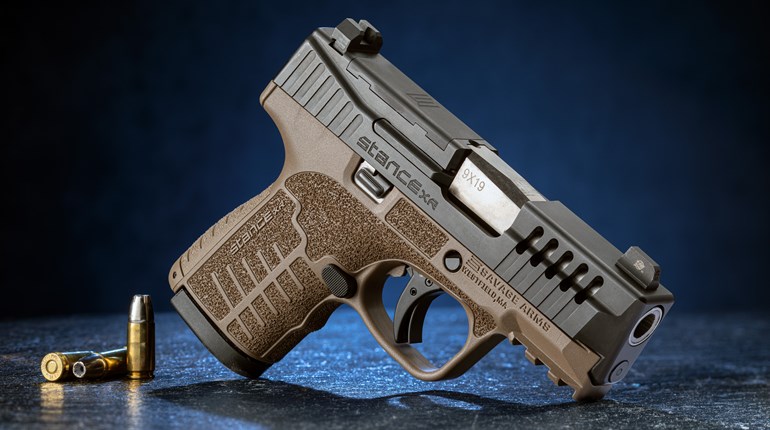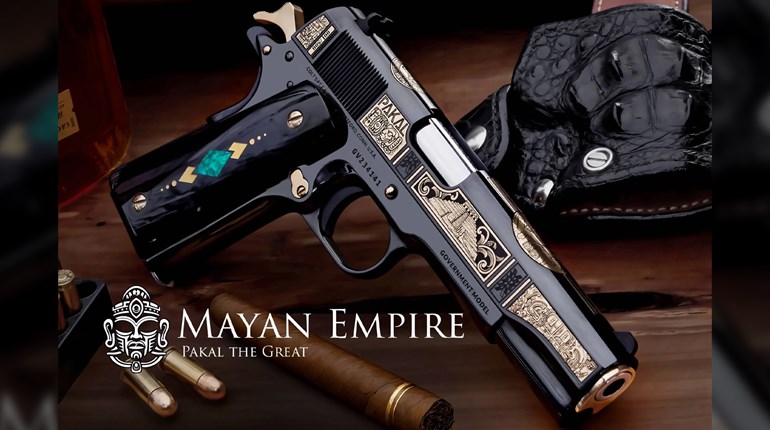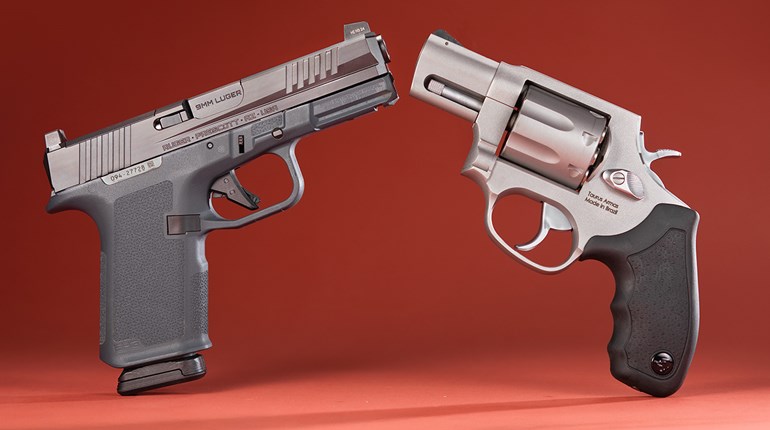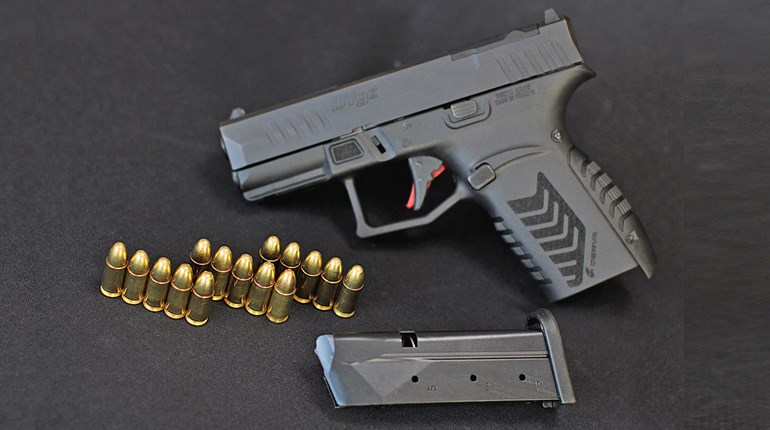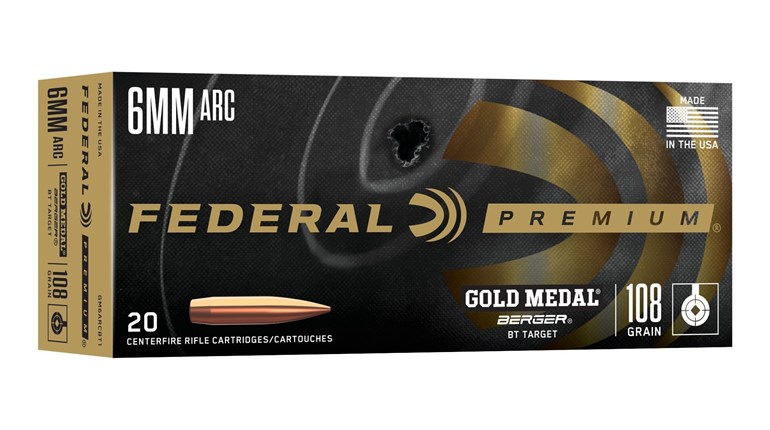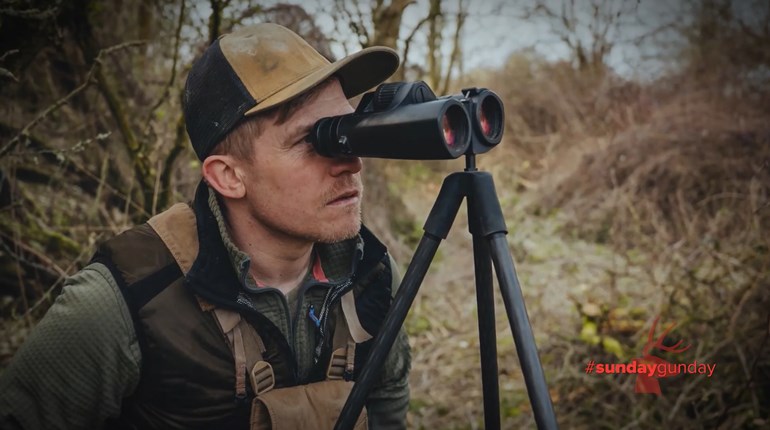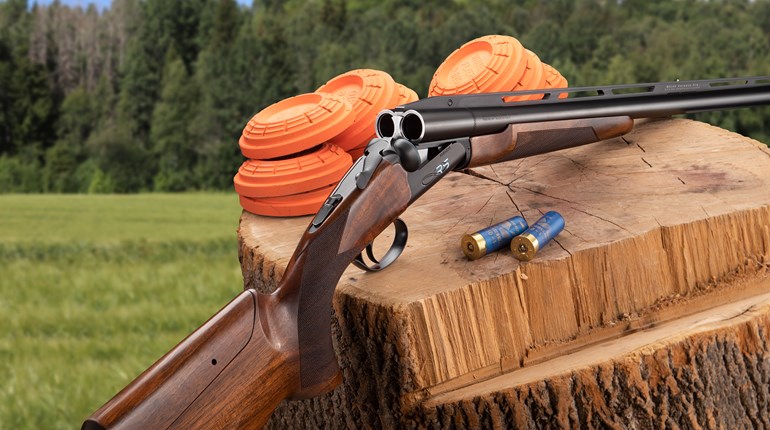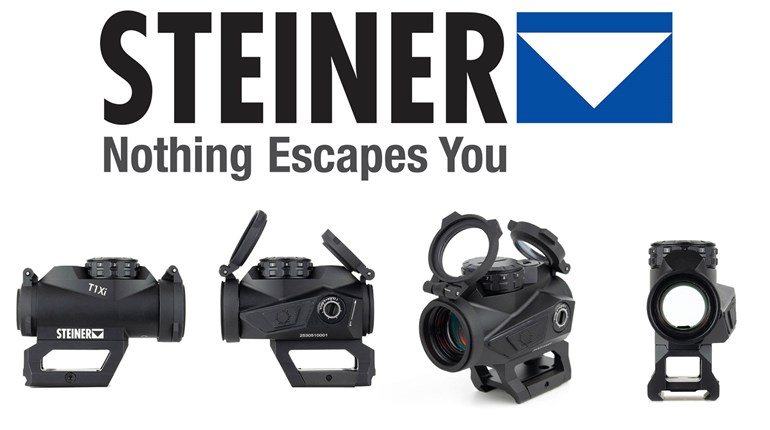
I’m a believer in the old expression “You never get a second chance to make a first impression.” Browning apparently believes in it, too, because its newest downsized Black Label 1911 makes a fantastic first impression. Opening the plastic box, you are greeted by this classy little two-tone (actually three-tone, if you count the black and brown star-spangled grip panels), John Browning-designed, semi-automatic pistol chambered in the gentle .380 ACP. I was instantly smitten.
Like the original 1911 pistols in .45 ACP, this little .380 version is a recoil-operated, tilting barrel, locked-breech, single-action semi-auto pistol; except it shrunk. It’s about 85 percent the size of its big brother, which is all that’s required for the more moderate .380 ACP cartridge and makes it both lighter to carry and easier to conceal. Manipulation of the downsized .380’s controls is easier for smaller hands, while controlling the .380 ACP’s reduced recoil is easier for those of smaller stature. But, before you start shooting it, there are several things you might want to admire.

The truncated Browning features sights that are larger than typical offerings and easy to see ∙ An extended slide stop promotes ease of actuation ∙ Generously spaced rear slide serrations foster ample purchase ∙ A deeply curved beavertail grip safety ensures a high hold on the pistol for maximum control, while an ambidextrous safety brings welcome versatility
I mentioned the three-tone appearance attributed to the satin-finished, stainless steel slide, the blued (actually more black in color) frame, and the “stars and stripes” motif on the wooden grip panels. I’m sticking with my original choice of words: Classy. Front and rear sights are dovetail-mounted and anchored with setscrews. Windage adjustments are on the menu; elevation changes are not. The sights are slightly larger (and better) than I’m used to on a small semi-auto, plus they feature today’s fairly popular three-white-dot configuration. The dot system worked well in the slightly diminished light of an indoor range, but for extended ranges outdoors in daylight, my eyes need a front sight with less blade width, allowing more light to appear in the rear notch.

Serrations along the pistol’s trigger face enhance control ∙ The two, eight-round magazines shipped with the pistol performed well.
A teardrop hammer nestles into a beavertail grip safety when the gun is cocked and ready to fire. Of the four different individuals who fired the gun while I evaluated it, no one was cut by the slide. Both frontstraps and backstraps feature subdued checkering for enhanced grip control in rapid-fire strings. The checkering on the back-strap actually extends to cover the surface of the bump on the grip safety, which is a nice touch. The magazine well had a slight relief cut in front to ensure the magazines went in all the way and locked in place, but the front edge had not been beveled. The slide stop extends back far enough I could manipulate it without moving my firing grip. I’m not trained to drop the slide that way, but I can see it’s a nice feature in the event you’re injured in a physical confrontation.
The pistol also featured a skeletonized trigger and an ambidextrous thumb safety. There was a slight hitch in the trigger’s pull not typical of quality 1911s—nothing horrendous, but once the initial slack is taken up, there is an additional “gritty” click before the hammer is finally released. It was not a problem when shooting, just not quite the excellence expected when I first examined the gun. The only feature I disliked was the magazine disconnect. If there is no magazine in the pistol, the trigger is blocked and you cannot fire the round in the chamber. I believe this is a bad idea on a defensive handgun.
As mentioned, Browning’s 1911-380 Black Label Pro American Flag is an exact duplicate of the original 1911 design, just in a smaller size. All controls move the same way and perform the same functions.
However, of the four shooters who shot the test gun, three had to significantly change their shooting grip to make the gun run. The “approved” 1911 shooting technique dictates that the thumb on the dominant hand first depresses and then remain on top of the thumb safety while firing the pistol. That thumb doesn’t go back down under the thumb safety until the shooting is over and you need to push the safety back up/on. Our problem was that putting your thumb on top of the safety pulled the web of your hand far enough back from the little .380’s grip safety so that it was not fully depressed as necessary for firing. When you change from one gun that “fits” you to another that doesn’t, expect to make some adjustments. Three of us changed our grips and the Browning ran flawlessly.

I would note that more than half the five-shot groups with Hornady produced four-shot groups right around 2 inches. The Hornady rounds also seemed slightly less “snappy” than the DoubleTap offerings.
At this stage, there was nothing “classic” about the sight picture; it was all about the three white dots. I’d like to say there was a crescendo of dramatic music in the background, but there wasn’t. There were, however, 16 holes at various locations in the target’s center-mass area.


*Note: Length is 7.5 inches, not 9.5 inches as indicated above












